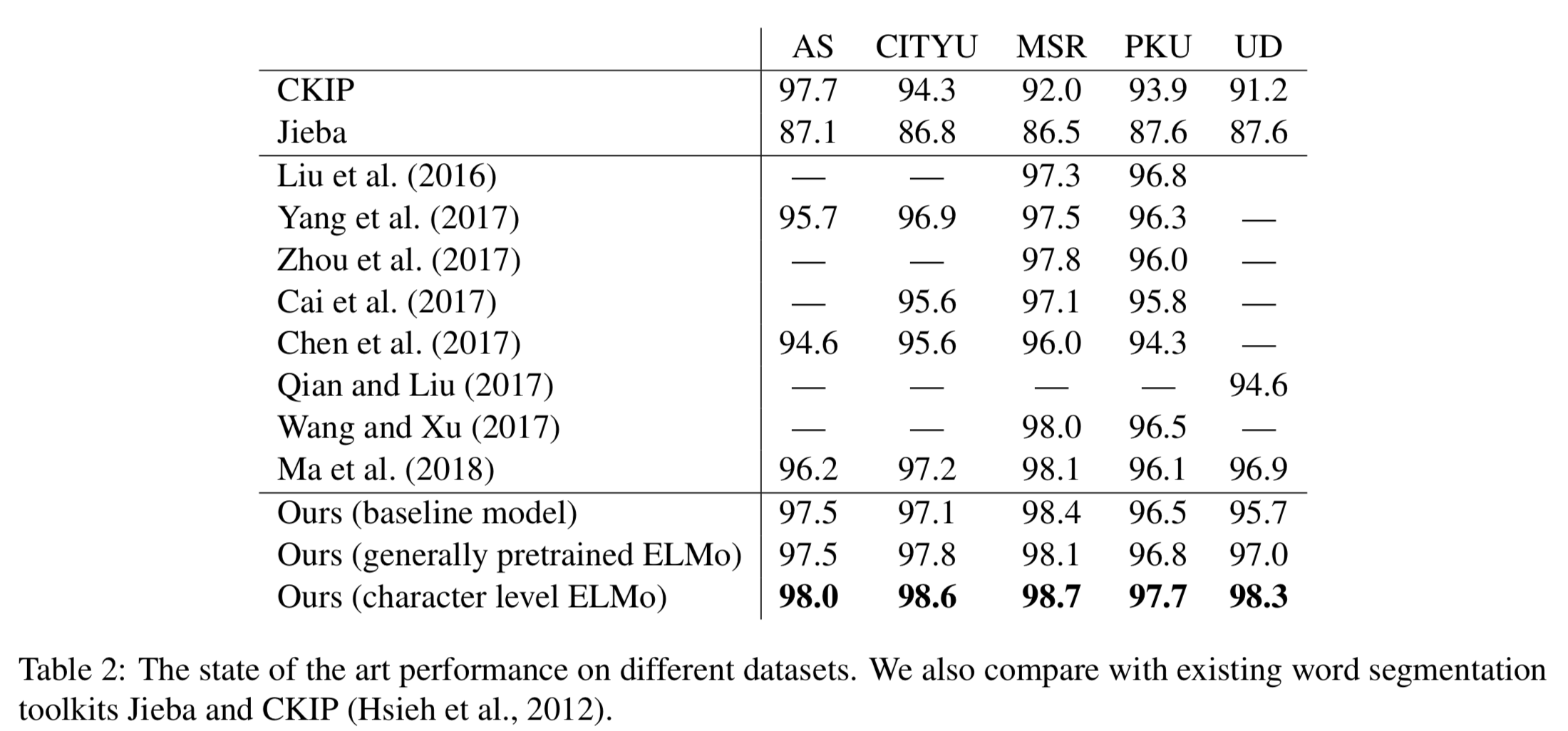Open source state-of-the-art Chinese word segmentation toolkit
Project description
Pywordseg
基於 BiLSTM 及 ELMo 的 State-of-the-art 開源中文斷詞系統。
An open source state-of-the-art Chinese word segmentation system with BiLSTM and ELMo.
- arXiv paper link: https://arxiv.org/abs/1901.05816
- PyPI page: https://pypi.org/project/pywordseg/
Performance
- 此專案提供圖中的 "character level ELMo" model 以及 "baseline" model,其中 "character level ELMo" model 是當前準確率最高。這兩個 model 都贏過目前常用的斷詞系統 Jieba (HMM-based) 及 CKIP (rule-based) 許多。
- This repo provides the "character level ELMo" model and "baseline" model in the figure. Our "character level ELMo" model outperforms the previous state-of-the-art Chinese word segmentation (Ma et al. 2018), and also largely outerform "Jieba" and "CKIP", which are most popular toolkits in processing simplified/traditional Chinese text.
- 當處理訓練時未見過的詞時,"character level ELMo" model 仍然保有不錯的正確率,相較於"baseline" model。
- When considering OOV accuracy, our "character level ELMo" model outperforms our "baseline" model about 5%.
Usage
Requirements
- python >= 3.6 (do not use 3.5)
- pytorch 0.4
- overrides
Install with Pip
$ pip install pywordseg- the module will automatically download the models while your first import within 1 minute.
- if you use MacOS and encounter the urllib.error.URLError problem when downloading your models,
try$ sudo /Applications/Python\ 3.6/Install\ Certificates.commandto bypass the certificate issue.
Install manually
$ git clone https://github.com/voidism/pywordseg- download ELMoForManyLangs.zip and unzip it to the
pywordseg/pywordseg(the code of the ELMo model is from HIT-SCIR, training by myself in character-level) $ pip install .under the main directory
Segment!
# import the module
from pywordseg import *
# declare the segmentor.
seg = Wordseg(batch_size=64, device="cuda:0", embedding='elmo', elmo_use_cuda=True, mode="TW")
# input is a list of raw sentences.
seg.cut(["今天天氣真好啊!", "潮水退了就知道,誰沒穿褲子。"])
# will return a list of lists of the segmented sentences.
# [['今天', '天氣', '真', '好', '啊', '!'], ['潮水', '退', '了', '就', '知道', ',', '誰', '沒', '穿', '褲子', '。']]
Parameters:
- batch_size: batch size for the word segmentation model, default:
64. - device: the CPU/GPU device to run you model, default:
'cpu'. - embedding: (default:
'w2v')'elmo': the loaded model will be the "character level ELMo" model above, which runs slow.'w2v': the loaded model will be the "baseline model" above, which runs faster than'elmo'.
- elmo_use_cuda: if you want your ELMo model be accelerated on GPU, use
True, otherwise the ELMo model will be run on CPU. This param is no use whenembedding='w2v'. default:True. - mode:
WordSegwill load different model according to the mode as listed below: (default:TW)TW: trained on AS corpus, from CKIP, Academia Sinica, Taiwan.HK: trained on CityU corpus, from City University of Hong Kong, Hong Kong SAR.CN_MSR: trained on MSR corpus, from Microsoft Research, China.CN_PKUorCN: trained on PKU corpus, from Peking University, China.
Include External Dictionary (Optional)
This feature was inspired by CKIPTagger.
# import the module
from pywordseg import *
# declare the segmentor.
seg = Wordseg(batch_size=64, device="cuda:0", embedding='elmo', elmo_use_cuda=True, mode="TW")
# create dictionary with their relative weights to prioritize.
word_to_weight = {
"來辦": 2.0,
"你本人": 1.0,
"或者是": 1.0,
"有興趣": 1.0,
"有興趣的": "2.0",
}
dictionary = construct_dictionary(word_to_weight)
print(dictionary)
# [(2, {'來辦': 2.0}), (3, {'你本人': 1.0, '或者是': 1.0, '有興趣': 1.0}), (4, {'有興趣的': 2.0})]
# 1) segment without dictionary.
seg.cut(["你本人或者是親屬有興趣的話都可以來辦理"])
# [['你', '本人', '或者', '是', '親屬', '有', '興趣', '的話', '都', '可以', '來', '辦理']]
# 2) segment with dictionary to merge words (only merge words that will not break existing words).
seg.cut(["你本人或者是親屬有興趣的話都可以來辦理"], merge_dict=dictionary)
# [['你本人', '或者是', '親屬', '有興趣', '的話', '都', '可以', '來', '辦理']]
# merged: '你', '本人' --> '你本人'
# merged: '或者', '是' --> '或者是'
# merged: '有', '興趣' --> '有興趣'
# not merged: '來', '辦理' -x-> '來辦', '理' because it breaks existing words
# 3) segment with dictionary that force words to be segmented (ignore existing words).
seg.cut(["你本人或者是親屬有興趣的話都可以來辦理"], force_dict=dictionary)
# [['你本人', '或者是', '親屬', '有興趣的', '話', '都', '可以', '來辦', '理']]
# merged: '你', '本人' --> '你本人'
# merged: '或者', '是' --> '或者是'
# change: '有興趣', '的話' --> '有興趣的', '話'
# change: '來', '辦理' --> '來辦', '理'
TODO
- 目前只支援繁體中文(即使選擇CN mode,文字也要轉換成繁體才能運作,目前訓練資料都是經過 OpenCC 轉換的),日後會加入簡體中文。
Citation
If you use the code in your paper, then please cite it as:
@article{Chuang2019,
archivePrefix = {arXiv},
arxivId = {1901.05816},
author = {Chuang, Yung-Sung},
eprint = {1901.05816},
title = {Robust Chinese Word Segmentation with Contextualized Word Representations},
url = {http://arxiv.org/abs/1901.05816},
year = {2019}
}
Project details
Release history Release notifications | RSS feed
Download files
Download the file for your platform. If you're not sure which to choose, learn more about installing packages.
Source Distribution
Built Distribution
Filter files by name, interpreter, ABI, and platform.
If you're not sure about the file name format, learn more about wheel file names.
Copy a direct link to the current filters
File details
Details for the file pywordseg-0.1.4.tar.gz.
File metadata
- Download URL: pywordseg-0.1.4.tar.gz
- Upload date:
- Size: 12.1 kB
- Tags: Source
- Uploaded using Trusted Publishing? No
- Uploaded via: twine/3.4.1 importlib_metadata/4.0.1 pkginfo/1.7.0 requests/2.25.1 requests-toolbelt/0.9.1 tqdm/4.60.0 CPython/3.8.3
File hashes
| Algorithm | Hash digest | |
|---|---|---|
| SHA256 |
2ce58dbc40660d1bf11f4c9844d824189c41023159b9a488e387fff6af3ae0c5
|
|
| MD5 |
b2e87d91d55e1cde6843ebe948026837
|
|
| BLAKE2b-256 |
351e3b175681b8bbf4d9c06f410f9daf054013933a3206deaaca7956b7f6b42d
|
File details
Details for the file pywordseg-0.1.4-py3-none-any.whl.
File metadata
- Download URL: pywordseg-0.1.4-py3-none-any.whl
- Upload date:
- Size: 10.8 kB
- Tags: Python 3
- Uploaded using Trusted Publishing? No
- Uploaded via: twine/3.4.1 importlib_metadata/4.0.1 pkginfo/1.7.0 requests/2.25.1 requests-toolbelt/0.9.1 tqdm/4.60.0 CPython/3.8.3
File hashes
| Algorithm | Hash digest | |
|---|---|---|
| SHA256 |
b410051f7703e744b06602a90adf4f79d56d207a0a398ccdda27739846a402ed
|
|
| MD5 |
2d5ce86da71f5e59ddfe371d0dd90e80
|
|
| BLAKE2b-256 |
74cc3c208f90aaf8ff186fa9d93158ec417da56eea5eaf8682e3718b877cbdbe
|













